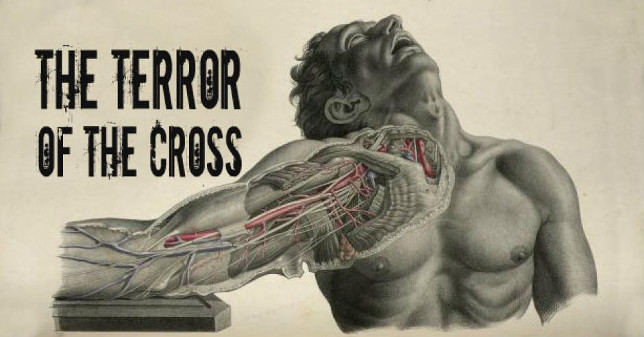We Christians are able to take delight in one of history's most horrific forms of execution: crucifixion. 21st century Westerners are culturally detached from what crucifixion does to a society, but crucifixion hasn't always served as a symbol of salvation. Marcus Tullius Cicero was a Roman thinker who died about 50 years before Christ was born. To him, crucifixion was something that struck terror into the hearts of Roman society and needed to be done away with and forgotten about. He writes about the cross and other Roman atrocities:
Wretched is the loss of one's good name in the public courts, wretched, too, a monetary fine exacted from one's property, and wretched is exile, but, still, in each calamity there is retained some trace of liberty. Even if death is set before us, we may die in freedom. But the executioner, the veiling of heads, and the very word "cross," let them all be far removed from not only the bodies of Roman citizens but even from their thoughts, their eyes, and their ears. The results and suffering from these doings as well as the situation, even anticipation, of their enablement, and, in the end, the mere mention of them are unworthy of a Roman citizen and a free man. Or is that, while the kindness of their masters frees our slaves from the fear of all these punishments with one stroke of the staff of manumission, neither our exploits nor the lives we have lived nor honors you have bestowed will liberate us from scourging, from the hook, and, finally, from the terror of the cross?1
Surely Cicero was not expecting that one day God would send His Son as a sacrifice on a cross, and that through this sacrifice He would be glorified. Throughout the Bible, we see God's relationship developing with mankind. Whether it's by delivering the Law to the nation of Israel, fulfilling His promise to send a Redeemer, or in the future when He establishes His kingdom, the greater purpose of His mission is His glory. The Apostle Paul writes about Christ Jesus:
who, existing in the figure of God, did not consider it robbery to be equal to God, but emptied Himself, taking the figure of a bond servant becoming in likeness of people and being found in figure as a person, He humbled Himself, becoming submissive until death- even death of a cross! And therefore, God has hoisted Him up and given Him a name that's above all names so that in the name of Jesus every knee of heaven and earth and below earth will bend and every tongue will acknowledge that Jesus Christ is Lord to the glory of God the Father. Philippians 2:5-11
How wonderful it will be when that day comes! Until then, we Christians correct Cicero when we sing the famous words of Isaac Watts:
When I survey the wondrous cross1 Cicero, Pro Rabirio Perduellionis Reo 16. Available online here.
on which the Prince of glory died,
my richest gain I count but loss,
and pour contempt on all my pride.
Forbid it, Lord, that I should boast
save in the death of Christ, my God!
All the vain things that charm me most,
I sacrifice them through his blood.
See, from his head, his hands, his feet,
sorrow and love flow mingled down.
Did e'er such love and sorrow meet,
or thorns compose so rich a crown?
